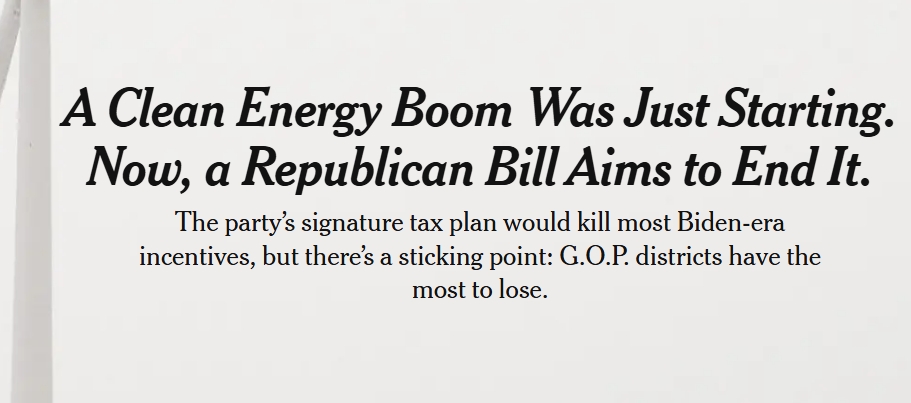Is Brazil Ready for COP30? No One Is Ready for COP30
The Drain is a weekly roundup of climate and environmental news from Legal Planet.

It’s officially less than 6 months until COP30 — when tens of thousands of people will descend on the Brazilian city of Belém for the annual UN climate conference — and no one is ready.
For one thing, Belém is an impoverished city of 2.5 million that can’t build enough hotels for the 50,000 expected delegates and 150 heads of state that attend Climate Coachella. You may need to book a river boat.
More importantly, there is no agreement on how to get the phaseout of fossil fuels on the COP30 agenda. Key language from 18 months ago at COP28 in Dubai stating that nations work toward a “transition away from fossil fuels in energy systems in an orderly, just and equitable manner” has not yet made the conference’s emerging agenda, write Andreas Sieber and Stela Herschmann, adding “that must change.”
Meanwhile, the head of Brazil’s state-run oil giant Petrobras (appointed by Brazil President Luiz Inacio Lula da Silva) faced criticism last week after a video emerged of her saying “Drill, baby, drill!” referring to an oil exploration project near the mouth of the Amazon River, Fabiano Maisonnave reports for AP. Brazil is leaping ahead of the US on climate policy, but the country remains deeply polarized and faces a disinformation landscape as bad as our own. “The strategy is to weaken the UN conference that has been trying for so long to resolve one of our biggest crises, the climate crisis, and to cast doubt on Brazil’s role as host,” write the hosts of a new newsletter called “Oii” that analyzes the actors and tactics shaping disinformation and its impact on climate action in Brazil ahead of COP30.
But it’s not just Brazil. One more reason we’re not ready for COP30 is that only 21 countries — 11% of the parties — have put forward new targets to cut greenhouse gas emissions through to 2035, as required by the Paris Agreement. Brazil and UN officials are encouraging two particularly important players — China and the EU — to submit their so-called NDCs (nationally determined contributions) by September.
An ambassador named André Aranha Corrêa do Lago is the COP30 President. He was in Beijing last month to discuss national pledges with Chinese officials, Manuela Andreoni reported for Reuters. This week, Brazil President Lula met with China’s President Xi Jinping in Beijing and even made announcements about investments in renewable energy.
Brazil is calling on local and state governments to do more, reports Matteo Civillini at Climate Home News. COP30 President Corrêa do Lago wrote an open letter to non-nation states to present climate initiatives – which he called “self-determined contributions.” This is important because states are on the front lines of climate change. They can do things nations aren’t willing to do. Brazil has promised to more directly involve regional and subnational leaders in the COP30 discussions. “The perception that the COPs are solving people’s concerns has decreased,” he said in a recent Wilson Center webinar. “Sometimes negotiators seem like people that are disconnected with the realities on the ground.” This is why states, and the governors who lead them, are going to be key players leading up to and during COP30 in Brazil. They are filling the void left by presidents. They are making forest preservation deals and cracking down on illegal logging. States in Brazil, Mexico, and Indonesia are working with states like California on best practices.
So, with Trump pulling out of the Paris Agreement yet again, will California Governor Gavin Newsom go to COP30? Will Illinois Gov. JB Pritzker? Don’t rule it out. There will be a fat, empty seat where the United States used to sit in the Conference of Parties. Why not fill it? A more interesting wager is whether Pope Leo XIV will come to Belém for COP30. The American Pope saw firsthand the impacts of climate change in Peru and would be a powerful, moral voice for climate action when we need one most.
As for Brazil, I’m not ready either! I’m running around this week to get a vaccine for yellow fever and typhoid. Next week, I am heading to Rio Branco, Brazil in the westernmost state of Acre. I’ll be in that Amazonian city for a week observing an annual meeting of governors who make up the Governors’ Climate and Forests Task Force, a project of UCLA that fosters collaboration on protecting tropical forests. I’m excited to see what states and provinces are doing to restore degraded lands and create sustainable jobs that don’t involve clear-cutting trees. I’ll be reporting on what I see in Brazil here at Legal Planet and in this column next week. For now, I need shots and a new raincoat.
Here’s what else is going on…
Good news!
Farmers win: Trump’s Agriculture Department will be restoring climate change data that it had scrubbed from its website when he first took office. That’s a big win for the farmers who sued over the deleted information, which included pages on federal funding, loans, and conservation projects — and any of us who don’t want to see climate data scrubbed from federal websites. The restoration is expected to take approximately 2 weeks. “We’re glad that USDA recognized that its blatantly unlawful purge of climate change-related information is harming farmers and communities across the country,” said Jeffrey Stein, an Earthjustice attorney on the case.
Solar Kingdom: Almost all new homes in England will be fitted with solar panels during construction within two years, the government will announce, the Guardian reported. Housebuilders will be legally required to install solar panels on the roofs of new properties by 2027 under the plans.
Gov’s New Ride: Governor Newsom has an official new ride—a black Rivian all-electric SUV. Rivian is a California electric vehicle manufacturer headquartered in Irvine. The vehicles are built in Illinois. Up until now, the governor’s vehicle had been a Chevy Suburban, CBS Sacramento reports. “It feels like it’s a bit of a slap in the face at Tesla,” said my Legal Planet colleague Ethan Elkind.
Bad news $@%#*!
Masters of Disaster: Trump fired acting FEMA administrator Cameron Hamilton after he defended the agency’s mission and purpose while NOAA said it will no longer track the cost of climate-fueled weather disasters, including floods, heat waves, wildfires and more. FEMA is also ending its policy of conducting door-to-door canvassing in disaster areas, reports Molly Taft for WIRED
Short Circuit: Rewiring America, the leading housing electrification nonprofit, laid off 28 percent of its staff last Thursday because EPA has barred it from accessing its climate law grant award for nearly three months. “We will continue defending our rights in court and fight optimistically to victory,” wrote CEO Ari Matusiak. “But unfortunately we are now forced to act financially as though the GGRF award does not exist. Sierra Club is also readying another round of staff layoffs.
Bad math: Trump is erasing the “social cost of carbon.” The federal government will no longer “maintain a uniform estimate of the monetized impacts of greenhouse gas emissions,” Jeffrey B. Clark, the acting administrator of the White House Office of Information and Regulatory Affairs, wrote in a May 5 memo. The NY Times notes that Clark even doubted the scientific consensus that pollution is heating the planet.
They Hate Efficiency: The DOE moved Monday to repeal or alter 47 energy efficiency, climate reporting and other regulations, but my UCLA colleague Denise Grab tells Utility Dive that the Trump administration will likely face robust legal challenges. “The rollbacks will then be subject to legal challenges under the Administrative Procedure Act, as being arbitrary and capricious, and potentially illegal under other applicable laws,”
Fast Gas: SoCal Gas is streamlining gas restoration in the fire-hit areas of Altadena and Pacific Palisades. While it’s good to get people back on their feet, there are real benefits for rebuilding all-electric. It can be faster, cheaper, and better for long-term resilience, as LAist reports. But the utility company says it has restored service to almost 16,000 customers in the Eaton and Palisades fire areas. Are we rebuilding safer?
Fewer cherries: Extreme heat in the Central Valley is hurting California’s cherry crop. The Sac Bee reports that farmers in Fresno and Tulare counties are reporting significantly lower yields of fruit this year. In California’s pending lawsuit against Big Oil for deceiving the public about climate change, the attorney general writes that “Only 4% of the area of the Central Valley was suitable in the year 2000 for species such as apples, cherries, and pears, which have annual chilling requirements of more than 1,000 hours; however, virtually no areas in California will remain suitable by 2041–2060 under any emissions scenario for these types of fruit crops.” Save the cherries!

California, Cap and Trade
Gov. Newsom is scheduled to unveil his annual revised spending plan this morning and the state’s cap-and-trade program is a major line item. Will the billions in revenue backfill the DMV? Will it be a straightforward reauthorization with later, attendant legislation to modify the details and address environmental justice concerns?
- The Legislative Analyst’s Office, which advises the Legislature on financial matters, released a report on the cap-and-trade system. Top findings: Cap-and-Trade Plays Important Role in Helping State Reduce GHGs Cost-Effectively; If the program were to be extended for 15 years (until 2045), we estimate that emitters could potentially pay a couple of hundred billion dollars for allowances during this period. Many of these charges likely would be passed on to California households and businesses in the form of higher prices, such as for gasoline and diesel fuel. Notably, however, the revenue from these charges also can be directed to meet legislative priorities
- My UCLA colleague Cara Horowitz continues to analyze the US DOJ’s marching orders to attack state climate climate laws like cap and trade here at Legal Planet.
- Politico Editor Debra Kahn has a Q&A with Joe Nation, the newest adviser to California’s cap-and-trade program.
- CalMatters’ Alejandro Lazo also has a good story and PBS segment on Trump’s EO on state climate laws could affect California’s landmark cap and trade program – a subject that columnist Dan Walters, also at CalMatters, has a fairly idiotic hot take: that making polluters pay will just pass the bill along to energy consumers – “So, there you have it.” Uh, rhere you have what? Walter says nothing of the climate costs consumers are already paying with no compensation by polluters toward state priorities. Not only is it weird to equate Polluters Pay legislation with a market-based mechanism like C&T. But climate change is costing us (ratepayers and taxpayers) money now.
New Litigation
- There’s a new EV challenge: California, Colorado, Washington 14 other states sued Trump’s administration last Wednesday for withholding billions of dollars for building more electric vehicle chargers, challenging the Federal Highway Administration’s authority to halt the funding.
- And a fake ‘energy emergency’ challenge: Washington is leading 14 states, including California, in yet another lawsuit to block an executive order from President Donald Trump that declared a “national energy emergency.” The lawsuit, filed last Friday, is the 20th suit California has filed or joined against Trump 2.0. It also follows an earlier suit over trying to kill wind energy projects.
Climate Liability
- A climate accountability lawsuit brought by the city of Boulder, Colorado against ExxonMobil and Suncor is advancing towards trial, Dana Drugmond reports, after the Colorado Supreme Court on Monday upheld the trial court’s decision denying the companies’ attempts to dismiss the case.
- Canada’s top court has turned down Ontario’s request to weigh in on a major challenge to its climate plan brought by a group of young activists. That means the challenge will instead be revived in an Ontario court.
Other stories, studies, policy papers worth your time
- Are you following the case of the $133 million Bat Tunnel? My UCLA colleague Jim Salzman has a look at what permitting reform in the United Kingdom can teach the United States about building and abundance.
- A new report from the Center for Climate Integrity exposes how the industry’s public claims about “advanced recycling” — a marketing term that describes various ways to use chemicals or heat to break down plastics — are deception.
- A small Massachusetts start-up is making some progress in building a solid-state EV battery that would make electric vehicles cheaper and more convenient than conventional cars, as the The New York Times reports
- The Environmental Defense Fund released the EPA’s annual accounting of greenhouse gas emissions, obtained via a Freedom of Information Act request, after the agency refused to make its results public, E&E News reports
- Democrats can be the party of reliable energy, robust domestic production and decarbonization, Arnab Datta argues at NYT Opinion
- State Farm can raise homeowner and other rates an average 17% starting next month, CalMatters reports, becoming the first insurance company to win approval to do so on an emergency interim basis in California.
- RFK Jr. really is full of shit in more ways than one, reports HEATED
- The House Ways and Means Committee released its proposed budget language, and it would effectively kill the IRA, reports Emily Pontecorvo for Heatmap News. The Shift Key podcast breaks down the process and the steps before a reconciliation bill would reach Trump’s desk and compares it to a “horror movie version of School House Rock” with jump scares galore. As my UCLA colleague Kimberly Clausing notes, the Joint Committee on Taxation score of the tax bill (which headed to mark-up yesterday) includes $560b in savings from gutting IRA. It’s nowhere near a done deal, but it’s still notable. The Brad Plumer story at NYT says it all:







Reader Comments